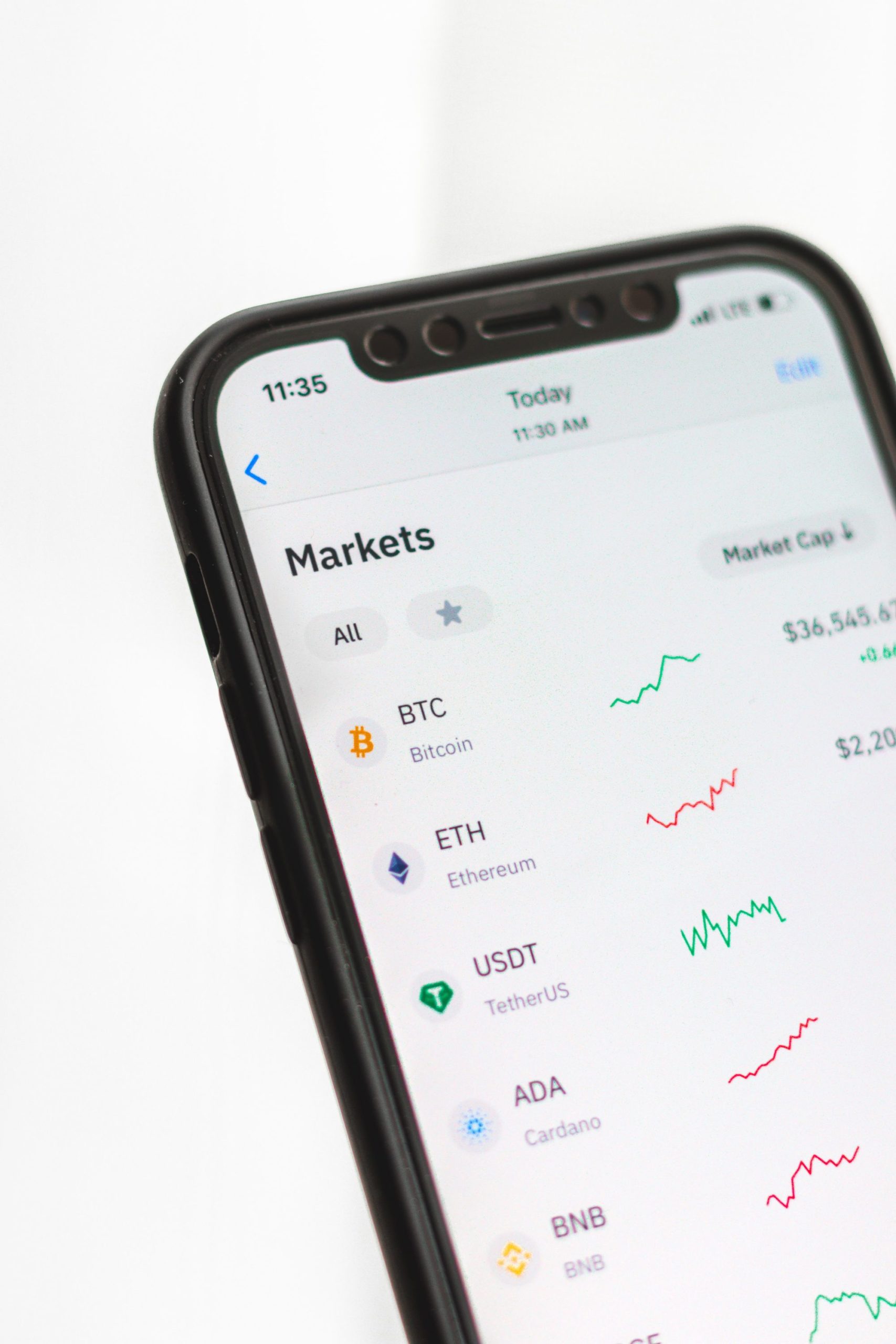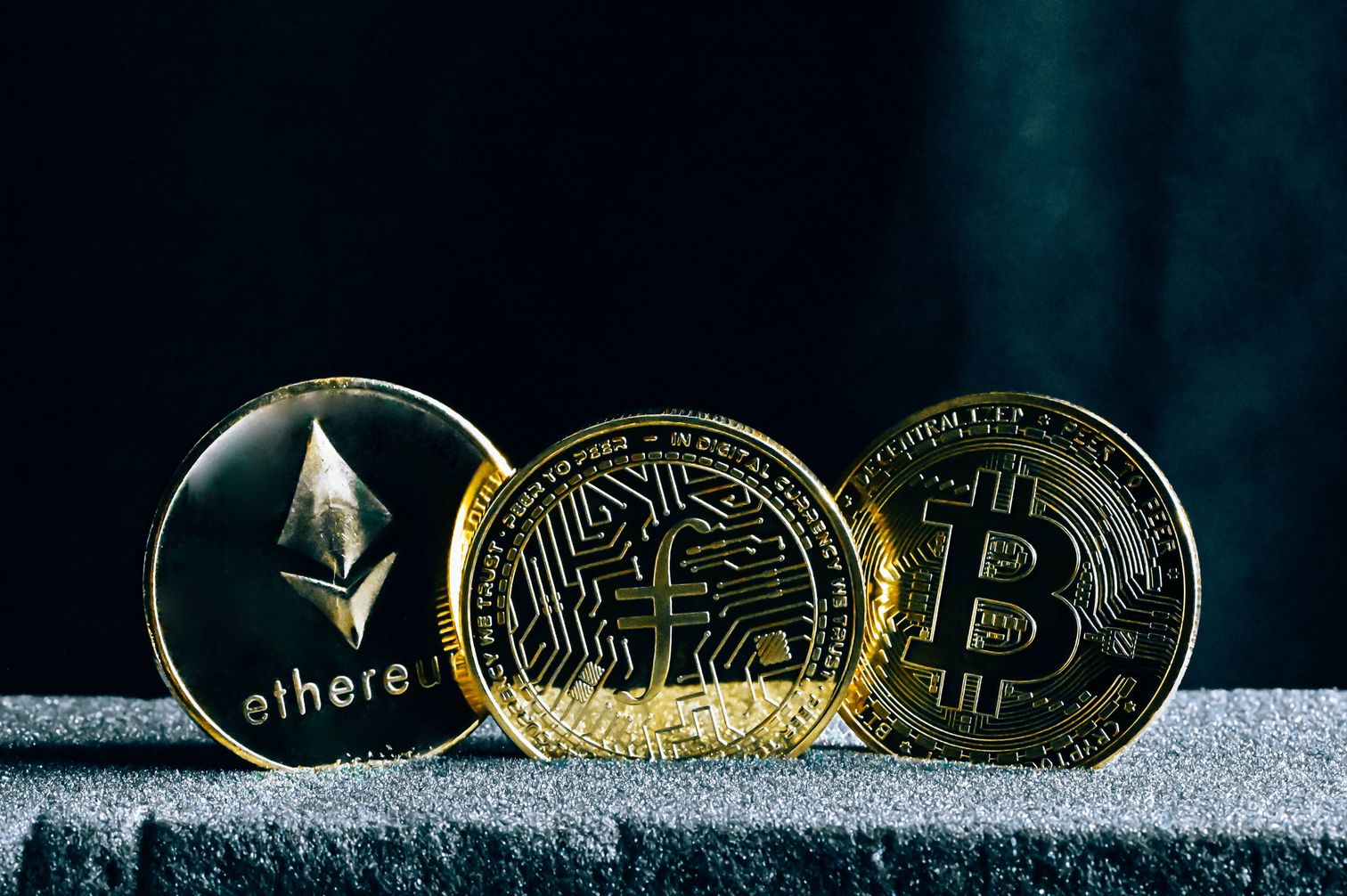Cryptocurrency
Disclaimer: Sharon Winsmith is not a financial advisor and is not engaged in the business of providing financial investment advice. The information contained on this page includes details regarding Sharon Winsmith’s personal investments. Nothing contained on this page or elsewhere on this website constitutes investment advice. We encourage you to do your own independent research and consult with your personal advisors before making any investment decisions.
We could spend thousands of pages talking about cryptocurrency, what it is, and how to invest in it. However, the key is to make sure you don’t jump on the Bitcoin bandwagon without doing your research first. I personally know a lot more people who have lost money investing in crypto than have made money at this point.
Similar to all other types of investments, you should only invest in cryptocurrencies for the long-term potential. We’ve all witnessed firsthand the value of Bitcoin skyrocket over night only to drop just as much or more the next day. I would need cases of Pepcid if I were to check my Coinbase Wallet on a daily basis.
If you are looking to make a quick buck, your odds are just as good, or better, going to Vegas. Those who really understand the true potential of cryptocurrencies and what they can bring to society, understand that the real return on investment will be years and years in the future. It is highly unlikely I will ever sell any of the cryptocurrency I own during my lifetime. If I do it certainly won’t be any time soon.
What Is Cryptocurrency?
It took me a long time to understand cryptocurrencies, how they work, and what their real value is. I still find myself learning new things every day about cryptocurrencies, blockchain technology, and mining. Trust me as someone who has devoted a lot of time to this area – this stuff ain’t easy.
I think of cryptocurrency is a digital asset that is designed to work as a medium of exchange without having a centralized network to support it. Most cryptocurrencies are based on blockchain technology. Blockchain technology is a whole other area that can really make your head explode trying to understand it.
It is important to understand that each different type of cryptocurrency has drastically different characteristics and features. They should each be examined separately as the pros and cons of one may be very different from the pros and cons of others.
A common misconception is that cryptocurrencies are all digital currencies. Some of them may operate more like a currency while others have very different features and uses.
In a lot of cases, investing in a certain cryptocurrency may be similar to investing in a startup company. Buying the cryptocurrency may be similar to buying shares of stock in that company. Many also view investing in crypto as an investment in software because it is designed and coded by its developers.
Perhaps the hardest thing to wrap your head around is that cryptocurrencies are digital. You cannot hold them and they never have any tangible form like a dollar bill or a gold coin. This is a hurdle many risk-averse investors cannot seem to pass.
Investing in Blockchain Technology
I view investing in crypto as an investment in the blockchain. From what I have read, blockchain technology is definitely the future, and the way I primarily invest in blockchain is through buying various different types of cryptocurrencies. Although crypto has many other pros, the main reason I invest in crypto is because I believe in the future of blockchain technology.
Pros and Cons of Investing in Cryptocurrency
Pros:
- Secure investment from fraud due to underlying blockchain technology
- No central bank that can engage in currency manipulation (hello inflation)
- Potential for high returns
- Liquidity for more popular forms of crypto (some less common cryptocurrencies are highly illiquid)
- No timing restrictions on trading (can trade around the clock and on weekends)
Cons:
- Highly volatile with large price swings
- Unpredictable mining fees
- Potential for use by bad guys (black market trading or terrorist)
- Negative environmental impact due to large energy consumption associated with mining (though this is often largely overstated by the media)
How to Invest in Cryptocurrency
1. Direct Ownership
These exchanges work similarly to online brokerage accounts where you can buy and sell stocks online. Some of the more popular exchange include:
- Coinbase (my favorite)
- Crypto.com (home of the LA Lakers)
- Kraken
- Robinhood (not a fan)
Because they are all so new, it is too early to tell which are the best. None of the exchanges are particularly user-friendly but there are noticeable improvements being made to improve user experience.
Reporting is also not great yet. It can be difficult to see what your gains are on the cryptocurrencies you own. In some cases, you may have to track this yourself to compute what the actual gain or loss is at any given time.
Remember that you should never store your crypto on a public exchange. If possible, you will want to move your crypto to a secure wallet for digital storage.
2. EFTs
3. Owning Shares in Public Companies
Another way to invest in crypto might be to own shares in public companies, such as Coinbase (Ticker: COIN), that are largely centered around investing in or trading crypto.
For example, the share price of Coinbase largely tracks the prices of large cryptocurrencies such as Bitcoin and Ethereum. You might notice that when Bitcoin goes down in value, so does the share price of Coinbase.
This is similar to the approach many take to investing in oil. Instead of trading oil futures directly, which can be costly and complicated, investors choose to instead own shares in large petroleum companies like Exxon (Ticker: XOM). When the price of oil goes up, the share price of Exxon usually goes up as well allowing investors to cash in on the increase in the price of oil.
There are a number of pros and cons to this approach. It might be less risky than owning cyrto directly; however, it will also probably limit the upside potential from a single crypto that skyrockets in value.
How I Invest in Cryptocurrency
Before I invest in any new form of cryptocurrency, I start with studying the whitepaper for that crypto. This allows me to see what the main features are and how the technology behind the cryptocurrency.
There are a lot of crappy types of crypto out there that investors need to be wary of. Dogecoin, for example, was started as a joke by its developers but later became popular after a few tweets by Elon Musk. I have never seen any viable reason for investing in Dogecoin and many other forms of crypto.
This is why it is important that you study each cryptocurrency as a separate asset and make sure that it works within your overall investment strategy.
I prefer to own cryptocurrencies directly so that I can capture as much of the upside potential as possible. I buy and sell crypto exclusively through Coinbase.
I also own shares in Coinbase as I personally think Coinbase is a well-run company and likely to be the bank of the future.

How to Hold Cryptocurrency
You should never hold your cryptocurrency on an exchange. That means that after you buy the crypto on the exchange, you should transfer it to a digital wallet for safekeeping.
What gets stored in the wallet is not the cryptocurrency itself, but rather the very important private keys. Cryptocurrencies can be accessed using private keys which operate as passwords. A wallet will store these private keys for all the crypto you hold.
You want to make sure that you never, ever lose these private keys like the guy in the UK who lost $500M worth of Bitcoin when he lost his private keys.
There are different types of wallets you can use for storage and they each have their own pros and cons. Once I buy crypto on the Coinbase exchange, I then transfer the crypto to my Coinbase Wallet app for storage.
Some will tell you this is not the most secure way to store your crypto. If you are going to hold significant sums of crypto, it might be worth investing in a more sophisticated hardware storage solution that can provide additional layers of security.
There may also be other fees that can apply but in my experience, these fees are usually relatively minor.
There are some exchanges that have free commission trading.
Fees Associated with Investing in Cryptocurrency
There are fees that apply when you buy crypto on an exchange. The types of fees you may encounter include mining fees, network fees, or other types of fees.
These fees fluctuate quite a bit depending on current trading volume and how much crypto you are buying. There are many alternatives to trading cryptocurrency that have lower fees than Coinbase. However, given how new cryptocurrency is, I prefer to use an exchange like Coinbase that I trust.
Fees are also charged when you transfer your crypto from the exchange to your wallet for digital storage.

4 Cryptocurrencies I Currently Own
1. Bitcoin (BTC)
Bitcoin is the largest and most popular cryptocurrency, at least for now. Many people mistakenly think Bitcoin is the only cryptocurrency that exists. For now, it is the most widely accepted crypto as payment for goods as some companies are starting to accept Bitcoin for payment.
2. Ethereum or Ether (ETH)
I think of Ethereum or Ether as the most popular crypto that acts as an actual digital currency. Ethereum is a platform itself with ether (ETH) being the cryptocurrency that is used to transact on the Ethereum platform. Ether is commonly used to buy and sell digital assets.
Many video games are built on the Ethereum platform. Users can buy and sell digital assets within the game using Ether. Most NFTs today are purchased with Ether and can be traded on Ethereum marketplaces. There are also other forms of cryptocurrency, such as MANA, which are built on Ethereum blockchain.
In my opinion, the future uses for Ethereum are unlimited. I am probably most bullish on Ethereum over any other crypto.
One thing to note here is that Ethereum, unlike Bitcoin, has a good number of viable competitors, like Solana, that may end up being more popular in the future. For example, some forms of crypto that have many of the same features as Ethereum are said to have a significantly smaller carbon footprint from mining activities.
3. Solana (SOL)
Solana is another blockchain platform, and its main cryptocurrency is SOL. Many view Solana as a direct, and more environmentally-friendly competitor to Ethereum. I invested in Solana to start to diversify my crypto holdings.
4. Decentraland (MANA)
You may have heard about all the recent craze around virtual real estate. Decentraland is one of the more popular virtual platforms where users can buy and sell virtual real estate. MANA is built on the Ethereum network.
I pay enough for my NYC apartment in real life so I am not looking to buy more real estate inside the metaverse. Instead, I invest in the metaverse and this virtual real estate boom/craziness by owning the cryptocurrency that is used for these transactions.
I don’t have a lot of money invested in MANA and I don’t really see a great deal of long-term potential in these types of cryptocurrencies. However, this is a way I can invest in all the craziness around the metaverse without having to worry about mowing a virtual lawn or keeping other landowners off my virtual property.
